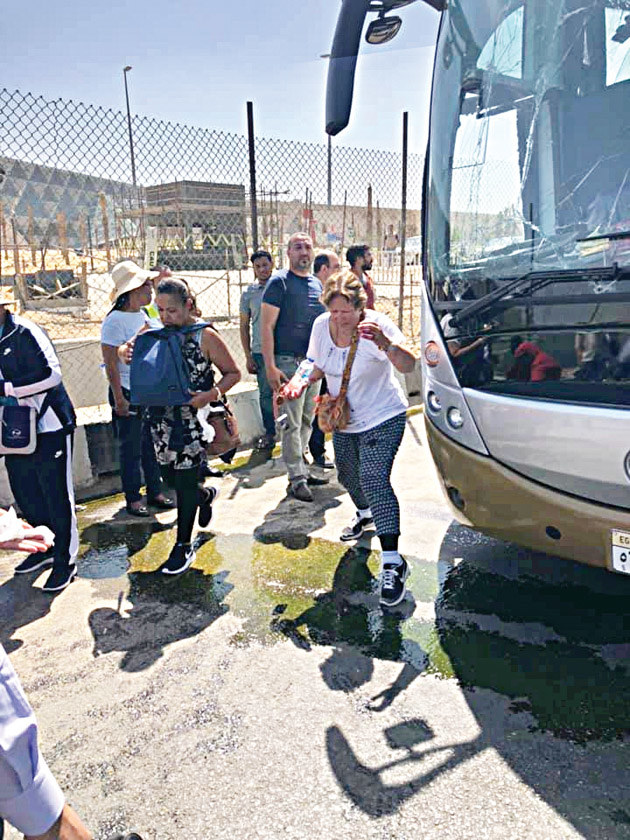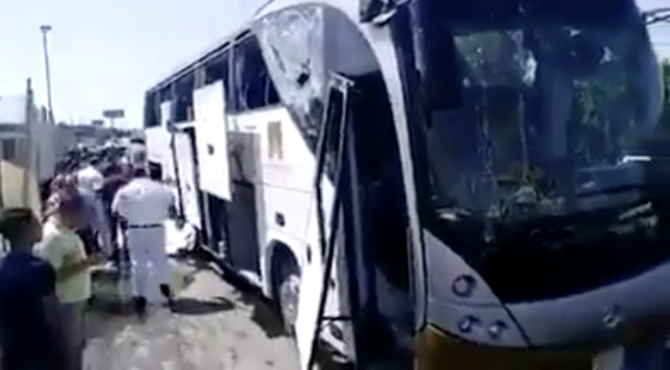CAIRO: An explosion targeting a tourist bus injured at least 17 people near a new museum being built close to the Giza Pyramids in Egypt on Sunday, two security sources said.
The bus was carrying 25 South African tourists, while a private car behind it was carrying four people. Most of the wounded included South African nationals.
A source at Al-Haram Government Hospital said there were no deaths and that people were in a stable condition.
Security and judicial sources said the explosion was caused by a bomb that had been placed near the wall of the Grand Egyptian Museum.
They said a rudimentary device containing nails and pieces of metal had been detonated remotely on the perimeter of the museum, not far from the site of a roadside blast that hit another tourist bus in December.
A witness, Mohamed El-Mandouh, told Reuters he heard a "very loud explosion" while sitting in traffic near the site of the blast.
Pictures posted on social media showed a bus with some of its windows blown out or shattered, and debris in the road next to a low wall with a hole in it.
The Cairo-Alexandria road is one of the busiest routes used by tour buses because it leads to the famous pyramid site.
The attack follows clear signs of recovery in the tourism sector, with a growth of 34 percent in the first quarter of 2019 in hotel occupancy and expectations for growth of more than 20 percent this year.
“It’s sad that Egypt is targeted this way,” Samir Mohamed, an engineer living in Cairo, told Arab News.
“Tourists hear about our great achievements for the Rod El-Farag bridge, the Grand Egyptian museum and our new capital but then terrorism spoils Egypt’s image.”
Last December three Vietnamese tourists and a local tour guide died after a roadside bomb hit their bus.
Pictures posted on social media showed a bus with some of its windows blown out or shattered, and debris in the road next to a low wall with a hole in it.
One witness told Reuters he heard a “very loud explosion” while sitting in traffic.
South Africa’s Foreign Ministry said staff from its embassy in Egypt were visiting hospitals to check on the reported injuries.
The museum is due to open next year as the new home for some of the country’s top antiquities on a site adjoining the world-famous Giza pyramids. It is part of an effort to boost tourism, a key source of foreign revenue for Egypt.
The sector has been recovering after tourist numbers dropped in the wake of a 2011 uprising and the 2015 bombing of a Russian passenger jet.
There was no damage to the museum from the blast, which happened 50 meters from its outer fence and more than 400 meters from the museum building, the Antiquities Ministry said in a statement.
There was no immediate claim of responsibility.
Egyptian security forces are waging a counter insurgency campaign against militants, some with links to Daesh, that is focussed in the north of the Sinai Peninsula.
Attacks outside Sinai have become relatively rare, though there have been several security incidents in recent months in Giza, across the Nile from central Cairo.
In December, three Vietnamese tourists and an Egyptian guide were killed and at least 10 others injured when a roadside bomb hit their tour bus less than 4 km from the Giza pyramids.
(With Agencies)





























